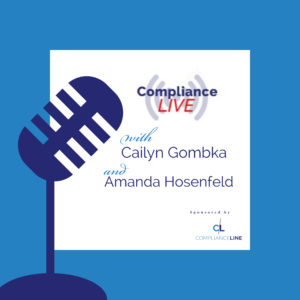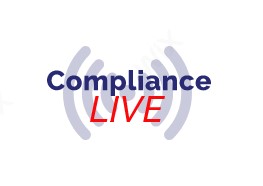In this special podcast, we discuss the U.S. Department of Justice Antitrust Division’s recently announced initiative to encourage corporations to develop and implement effective antitrust compliance programs. We consider the new guidance and special considerations during the COVID pandemic and provide practical tips for developing a comprehensive program, including tips on how to handle a federal and/or state antitrust investigations.
Moderator:
Dionne Lomax — Managing Director, Antitrust and Trade Regulation (Affiliated Monitors, Inc.)
Panelists:
Peter Mucchetti — Partner (Clifford Chance)
Vic Domen — Partner (Norton Rose Fulbright)
Jesse Caplan — Managing Director, Corporate Oversight (Affiliated Monitors, Inc.).
For more information on Affiliated Monitors, check out their website here.
Day: June 18, 2020

Amanda welcomes back Gio to finish up the last five questions in ComplianceLine’s new eBook TOP 10 QUESTIONS YOU SHOULD BE ASKING YOUR HOTLINE PROVIDER.
Check out more episodes and full episode videos at ComplianceLine.com, and don’t forget to subscribe on your favorite podcast platform!

Welcome to the newest addition to the Compliance Podcast Network, Compliance and Coronavirus. In this episode, I am joined by David McLaughlin, the founder of QuantaVerse. McLaughlin’s business leadership philosophy and results-oriented approach were honed over the course of both his military and corporate careers. He spent six years as a naval officer, starting in 1986 as an Ensign in the U.S. Navy and attending flight school in Pensacola, FL. A graduate of the highly regarded TOPGUN program, McLaughlin also completed a combat tour in the Persian Gulf, where he was awarded the Distinguished Flying Cross and two Air Medals for bravery in combat. Prior to founding QuantaVerse, McLaughlin held senior executive positions with IPR International, NES Financial, and SEI. He graduated from West Virginia University and received a master’s degree from Webster University.
In this episode, we consider some of the top questions QuantaVerse is hearing its clients; some of the top challenges financial institutions are facing during the Coronavirus health Crisis; how the reporting obligations of financial institutions impacted by the Coronavirus health crisis and the types of solutions that a financial institution can bring to bear at this point in time. We conclude with a discussion of how a financial institution can automate industry best practices when conducting an investigation, through the QuantaVerse Alert Investigator for Financial Institutions.
For more information on QuantaVerse, check out their website here.
For information on the QuantaVerse Alert Investigator for Financial Institutions, click here.
Requirements for the DPO
In this episode Jonathan Armstrong and Tom Fox are back to discuss issues relating to data privacy, data protection and GDPR. Today, we consider recent decision by the Belgian Data Protection Authority which imposed a fine of €50,000 ($54,203) on an un-named organization for non-compliance with the GDPR conflict of interest requirement; in the selection of its Data Protection Officer. Some of the highlights are:
- What were the issues and interests involved in this case?
- What are the requirements for a DPO under GDPR?
- How and why was the company ‘seriously negligent’?
- What are the implications going forward?
- What is this decision’s precedential value?
- How much expertise, authority and autonomy must a DPO have going forward?
Check out the Cordery Compliance, client alert on this case, click here. For more information on Cordery Compliance, go their website here. Also check out the GDPR Navigator, one of the top resources for GDPR Compliance by clicking here.

Jordan Domash is the General Manager of Relativity’s Trace product and this week’s guest. For 6 years, he has worked with Relativity in the fields of product and marketing, communications, and tactical projects. He helped build the early versions of Trace and grew it to where it is now. He joins Vince Walden to discuss how Trace works.
Communications are an important medium that adds context to structured data, as high-risk behaviors like collusion usually occur over communication vehicles. Trace is a compliance monitoring platform that proactively surveys all communications in near-real-time and allows compliance officers to configure rules that alert them of suspicious content. It monitors investment management compliance, trade, and looks out for bribery and corruption. Trace enables organizations to detect high-risk behaviors by normalizing a wide range of data and file types into a large database and quickly sifting through it with AI-empowered by human reviewers.
Trace has automated integrations with over 40 different data sources and carries out a set of small-batch processes incrementally throughout the day. Additionally, it supplies tools to manage data volumes so users can focus only on what’s relevant to them. Rather than for general monitoring, Trace is built for identifying a specific set of configured risks.
Resources
Jordan Domash on LinkedIn
Relativity.com | Trace
Richard Lummis and Tom Fox continue their a five-part series on leadership lessons from Theodore Roosevelt. We will look at lessons from Roosevelt’s early years in New York up to his cowboying days in Montana; the second phase of his public career, from NYC Police Commission to Assistant Secretary of the Navy, San Juan Hill and the Vice Presidency; his leadership from his Presidency; his life in the post-Presidency and the election of 1912 and we will end with leadership lessons from his post Bull Moose Party life, World War I and event surrounding his death. In this third episode, we consider the leadership lessons learned by Roosevelt in his ascension to the Presidency and his first and second terms as 26th President.
Highlights of this podcast include:
Roosevelt’s ascension to the Presidency after the assassination of President McKinley; his domestic policies including: trust busting, issues with railroads, starting the American conservation movement and regulation of food and drugs. We then turn to foreign policy and his arbitration of the Russo-Japanese War which won him the Nobel Prize, the Roosevelt Corollary to Monroe Doctrine and construction of the Panama Canal. We look at the clection of 1904 and his second term. We conclude with three key leadership lessons: 1. Surround yourself with other leaders; 2. Maintain an Open Channel with Adversaries; and 3. Be able to take criticism.
Resources
Doris Kearns Goodwin’s 10 Leadership Lessons from the White House
6 Leadership Hacks From The Rise of Theodore Roosevelt
10 top Leadership Principles of Teddy Roosevelt
The Roosevelts: Eight presidential lessons in leadership
Lessons in Leadership from 100 years ago
Theodore Roosevelt on Leadership
10 Theodore Roosevelt Leadership Lessons


